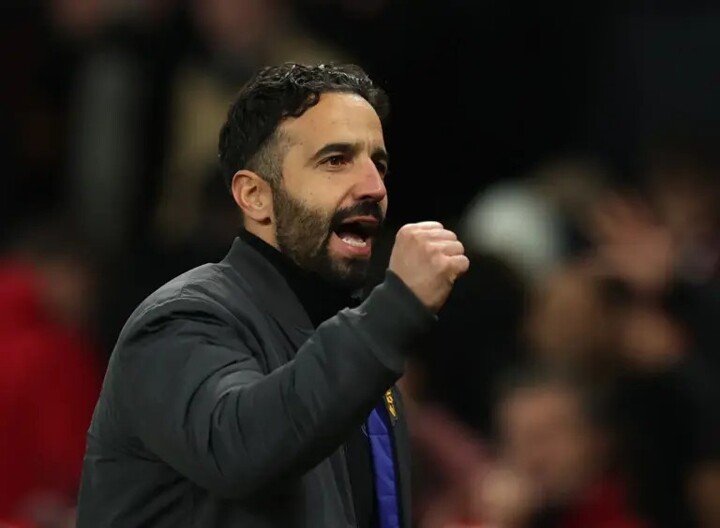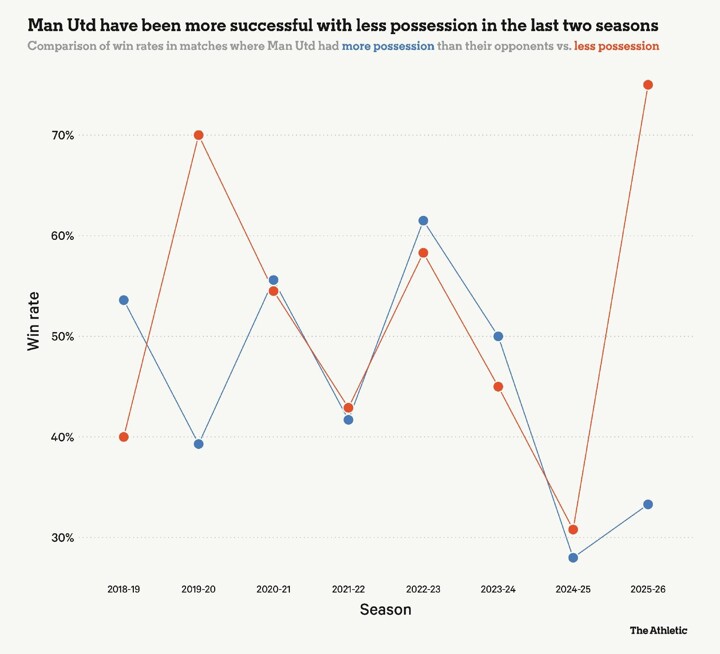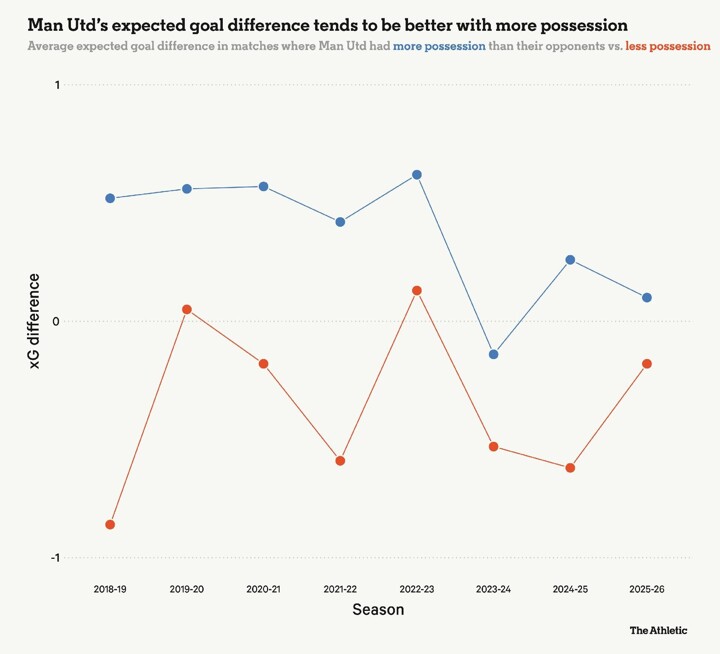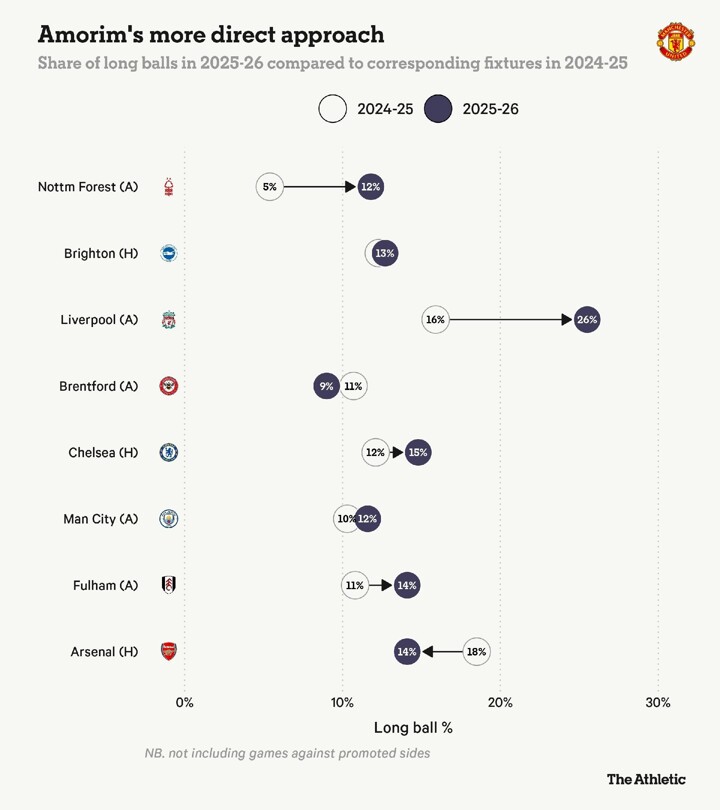The Athletic published a feature article analyzing Manchester United's recent performance and manager Amorin's tactics, stating that under Amorin, Manchester United often achieves better results in Premier League matches when they have lower possession.

Ten rounds of the 2025-26 Premier League season have been played, and Manchester United are gradually developing a clear tactical system.
Amorim is still using his 3-4-3 formation from last season, but a series of in-depth tactical adjustments have made his team play faster and more directly in recent weeks.
When asked before the 2-2 draw against Nottingham Forest if this had always been part of his plan, the Portuguese manager said, "I don't think we have to always start our attacks from the back to have a certain style."
Statistics reveal that under Amorim, Manchester United tend to achieve better results in Premier League matches when they have less possession.

This trend dates back to before this season, even before Amorin took over at Old Trafford in November 2024. Several seasons in Manchester United's recent history have shown that the team has been more successful in the Premier League when it doesn't dominate possession.

Is this merely a statistical coincidence, or a reflection of how Amorin has built this team's playing style?
More importantly, will this style of play present potential problems for the 40-year-old coach to address in the future?
What is Amorin trying to achieve?
In a press conference before last week's match against Forest, Amorin elaborated on his team's current playing style.
"We organize attacks to pressure the opponent and create space to score," he said. "If space exists, it's a numbers game. For example, if it's a three-on-three situation up front, and I have Seszko, Matthäus Cunha, and Mbomo, I'll finish the attack with two passes."
"I hope to score with two passes. But sometimes you have to patiently build. What I try to teach the players is how to play in different situations. That's my job. I don't want to teach players to build attacks by touching the ball too many times."
Amorim seems to prefer Manchester United scoring first in the most efficient way possible, and then controlling the tempo of the game from that point on.
“If you need a one-touch pass, just pass it in, because the fans want to see a different kind of game,” he said. “We’re in England. I’ve tried to show you a bit of English football in the past. That’s it. I don’t have a fixed way of organizing attacks. I just look at the space, the number of players, the characteristics of our players, and try to use those to win games.”
How does this relate to Manchester United’s possession statistics?
For Amorim, the team leading is usually the one controlling the game.
And the best way for Manchester United to score is to use a style of play that suits their best players. The team’s newly signed attacking trident is extremely threatening in transition, and behind them is Bruno Fernandes – a playmaker who particularly favors through balls.
The “numerical game” that Amorim mentioned refers to the team looking for numerical advantages in various areas during attacks. If they can create three-on-two or two-on-one situations for their key players, the team’s guiding principle is to quickly and directly advance the ball into the attacking third.
Manchester United's opening goal against Liverpool last month is a prime example. After several aerial duels, Fernandes ultimately won the second ball.
The United captain then spotted space behind left-back Kelkes and quickly passed the ball to the overlapping right wing-back Ahmad Diallo.
Amad then passed to Mbourneau, giving United the lead just two minutes into the game. The entire sequence involved minimal movement, demonstrating exceptional efficiency from back to front.
When considering the link between United's possession and their ability to win or even draw, match condition is crucial.
For Amorim, trying to control possession after taking a 1-0 lead at Anfield was largely pointless. Instead, they sought a compact defense, while Sloth's team pushed further up the pitch in an attempt to equalize. The higher Liverpool pushed, the more space United had behind them for direct attacks.
In the 2025-26 season, United's expected goals (xG) and expected goals conceded are slightly worse when possession is low, as shown in the chart below. However, as long as his team can control the source of the opponent's shots (i.e., from long-range shots or from the wings) and his own team can create good chances, this does not seem to be an immediate concern for the head coach.

Prioritizing scoring over possession to control the game
Amorim's direct style of play will not change when facing teams in the bottom half of the league.

If you look at the percentage of long passes this season and compare it to the corresponding match data in the 2024-25 season, it has improved in almost every game.
This style of play has remained consistent, whether playing at Old Trafford or away. After the 2-2 draw against Forest, Amorin stated that he felt the team was more energetic at home. However, this increased sharpness hasn't led his team to deliberately pursue more possession at home.
Haven't Manchester United fans seen this style of play before?
To some extent, yes.
Mourinho, Solskjaer, and Ten Hag have all achieved some success at Manchester United by focusing on transition attacks. The latter even declared before the 2023-24 season that he intended to turn the club into "the best transition attacking team in the world."
Amorin likely reached this conclusion based on reasons similar to his predecessors:
1. This style of play suits the characteristics of most of the team's key players.
2. This style of play has proven effective against strong teams like Manchester City and Liverpool.
3. This style is reminiscent of the club's golden age and is sure to thrill fans.
But didn't these former managers all encounter problems breaking down deep defenses?
Unfortunately, they did.
All three tried to integrate expensive signings in hopes of giving their Manchester United an edge against deep defenses. The teams they built typically excelled at quick attacks and exploiting the space behind the defense, but struggled against teams that collapsed their defenses and didn't allow for such space.
As we explained before, this was a problem Amorin had long recognized before his first Premier League game in charge. Eventually, his teams would need to learn how to control possession and beat teams that tried to wear them down. He has repeatedly stated this season that his teams shouldn't always be chasing quick passes.
After the 1-1 draw against Fulham, he said: "When we scored, we forgot the way we were supposed to play."
"We were only thinking about keeping the score. We wanted to win so much that we forgot to maintain possession and try to press them deeper. That's how we gave part of the game to Fulham."
For Amorin, speed is not stupidity, and swiftness must not become recklessness. Throughout the game, the ball must be used actively and intentionally.
Maintaining a proper defensive structure will be key to this style of play throughout the season. Manchester United have performed well in long-ball attacks, but have also been vulnerable in defending long balls (another long-standing problem before Amorin took over).
What might happen next?
Manchester United will first improve Plan A – the direct style of play – and then eventually introduce Plan B: learning to control possession effectively.
Amorin's Manchester United could be a respectable team for the remainder of the season. They are improving, and their summer signings are adapting well to life at Old Trafford. Manchester United are currently on a four-game unbeaten run, the second-longest in the league, and their schedule should allow them to continue at a steady pace.
Lisandro Martinez's return to full fitness will also help United win games and make them more comfortable with more possession. The Argentine centre-back is a fierce tackler and an excellent forward passer, providing the team with more options for controlling the game and diversifying their play.
The approach of "looking for available space and creating numerical superiority where possible"—to some extent—worked well for Amorin's predecessors. If this season is considered the first part of a rebuild, then using a method that the players are familiar with and that has proven successful in the past has its value.
More challenges lie ahead—especially next month with Mbomo, Ahmad, and Mazraoui all away for the Africa Cup of Nations—but United are getting closer and closer to playing to their full potential.
There's more than one way to win. Amorin has every reason to avoid passing for the sake of passing.
